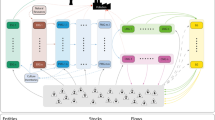Abstract
Culture plays a significant role in human civilizations as a key determinant of relationships and organization formation; however, its role, key properties, and mechanisms are not yet fully understood. This work explores culture and cultural modelling from a complex systems, multi-dimensional, and multi-agency standpoint. The need for performing such modelling and simulation is evident since in-vivo organizational experiments are costly, not easily generalizable, and require lengthy analyses that may not be feasible in critical situations. Exploring the role and influence of culture on organizations is the aim of this chapter, whereby definitions, dimensions, and experiments are introduced in order to show the evolution and emergence of culture as a complex, distributed, social system. This work contributes to culture studies by (a) adding to the literature of culture as a complex system, (b) presenting a new seven-dimensional model to describe and encapsulate culture, and (c) simulating cultural interactions using a multi-agent system of high-functioning agents that achieve an equilibrium of beliefs.
Access this chapter
Tax calculation will be finalised at checkout
Purchases are for personal use only
Similar content being viewed by others
References
Alvesson, M.: Understanding organisational culture. Human Resource Management Journal 13 (2003)
Ashkanasy, N., Wilderom, C., Peterson, M.: Handbook of organizational culture & climate. Sage Publications, Inc (2000)
Bar-Yam, Y.: Dynamics of complex systems. Perseus Books Cambridge, MA, USA (1997)
Bicocchi, N., Ross, W., Ulieru, M.: A simulation modelling approach enabling joint emergency response operations. In: Systems Man and Cybernetics (SMC), 2010 IEEE International Conference on, IEEE (2010) 1832–1837
Clancey, W., Sachs, P., Sierhuis, M., Van Hoof, R.: Brahms: Simulating practice for work systems design. International Journal of Human Computer Studies 49 (1998) 831–866
Conte, R., Castelfranchi, C., Dignum, F.: Autonomous norm acceptance. In: Intelligent Agents V. Agent Theories, Architectures, and Languages: 5th International Workshop, ATAL’98, Paris, France, July 1998. Proceedings, Springer (2000) 66–66
Dignum, F., Dignum, V.: Emergence and enforcement of social behavior. 18th World IMACS / MODSIM Congress, Cairns, Australia (2009)
Dignum, F., Dignum, V., Jonker, C.: Towards agents for policy making. Multi-Agent-Based Simulation IX (2009) 141–153
Floridi, L.: What is the Philosophy of Information? Metaphilosophy 33 (2002) 123–145
Hatch, M., Cunliffe, A.: Organization theory: Modern, symbolic, and postmodern perspectives. Volume 379. Oxford University Press Oxford (1997)
Hofstede, G.: Culture’s consequences: Comparing values, behaviors, institutions, and organizations across nations. Sage Publications, Inc (2001)
Hosseini, H.: A Reinforcement Learning Approach to Dynamic Norm Generation. Master’s thesis, University of New Brunswick (2010)
Hosseini, H., Ulieru, M.: How Adaptable Are Your Norms? Leveraging Domain Knowledge to Learn Normative Behaviors. In Proceedings of Adaptive and Learning Agents (ALA) workshop at Tenth international joint conference on Autonomous Agents and Multi-Agent Systems (AAMAS). Taiwan; 2–6 May 2011. (2011)
Kroeber, A., Kluckhohn, C., Untereiner, W., Meyer, A.: Culture: A critical review of concepts and definitions. Vintage Books New York (1952)
Kroeber, A., Kluckhohn, C., Untereiner, W., Meyer, A., of American Archaeology, P.M., Ethnology: Culture: A critical review of concepts and definitions. Vintage Books New York (1963)
Morris, A., Ross, W., Ulieru, M.: Modelling Culture in Multi-agent Organizations. AMPLE Workshop Proceedings, Tenth international joint conference on Autonomous Agents and Multi-Agent Systems (AAMAS). Taiwan; 2–6 May 2011. (2011)
Rao, A., Georgeff, M.: BDI agents: From theory to practice. In: Proceedings of the first international conference on multi-agent systems (ICMAS-95), San Francisco, CA (1995) 312–319
Savarimuthu, B., Cranefield, S., Purvis, M., Purvis, M.: Role model based mechanism for norm emergence in artificial agent societies. In: Proceedings of the 2007 international conference on Coordination, organizations, institutions, and norms in agent systems III, Springer-Verlag (2007) 203–217
Ulieru, M., Verdon, J.: Organizational transformation in the digital economy. In: 7th IEEE International Conference on Industrial Informatics (INDIN), IEEE (2009) 17–24
Von Bertalanffy, L.: General system theory: Foundations, development, applications. G. Braziller New York (1968)
Author information
Authors and Affiliations
Corresponding author
Editor information
Editors and Affiliations
Rights and permissions
Copyright information
© 2014 Springer International Publishing Switzerland
About this chapter
Cite this chapter
Morris, A., Ross, W., Hosseini, H., Ulieru, M. (2014). Modelling Culture with Complex, Multi-dimensional, Multi-agent Systems. In: Dignum, V., Dignum, F. (eds) Perspectives on Culture and Agent-based Simulations. Studies in the Philosophy of Sociality, vol 3. Springer, Cham. https://doi.org/10.1007/978-3-319-01952-9_2
Download citation
DOI: https://doi.org/10.1007/978-3-319-01952-9_2
Published:
Publisher Name: Springer, Cham
Print ISBN: 978-3-319-01951-2
Online ISBN: 978-3-319-01952-9
eBook Packages: Humanities, Social Sciences and LawPhilosophy and Religion (R0)




